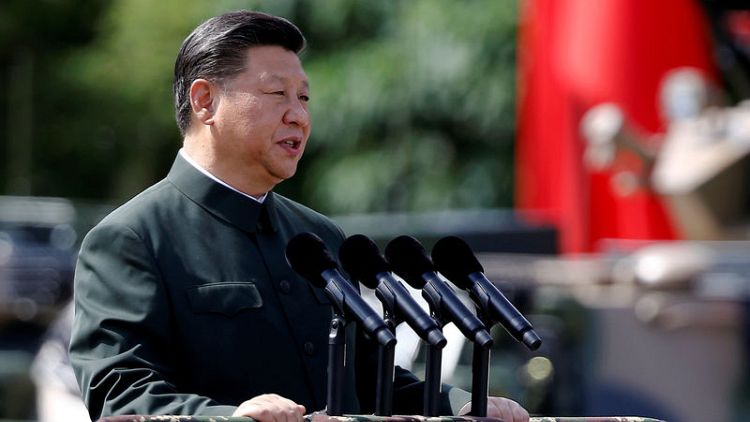BEIJING (Reuters) - China's propaganda work has been "absolutely correct" and those who work in the field should be trusted, President Xi Jinping told top officials, amid domestic criticism China has messed up its messaging over a trade dispute with the United States.
The growing trade conflict is causing rifts within China's Communist Party, with some critics saying that an overly nationalistic Chinese stance may have hardened the U.S. position, sources close to the government have said.
But speaking at a major meeting of senior propaganda officials, the first such gathering in five years, Xi said that since the previous Communist Party Congress, in 2012, propaganda efforts had been successful and made great strides.
"Superior traditional culture has been widely promoted, mainstream public opinion has been continuously consolidated and expanded, cultural self-confidence has been highlighted, national cultural soft power and Chinese cultural influence have been greatly enhanced," state media cited Xi as saying in a report late on Wednesday.
"Practice has proved that policy-making of the party centre on propaganda and ideological work is completely correct, and the broad masses of officials on the propaganda and ideological front are completely trustworthy," he added, without making direct reference to any specific issue.
The party has always maintained a tight grip over propaganda, especially over state media which it sees as a key tool to assert its authority and get its message out to the public.
The government has also stepped up already tight controls over the internet since Xi took power six years ago, in what critics say is an effort to restrict freedom of speech and prevent criticism of the party.
Xi said the internet must be "clean" and vulgar content must be resisted in the field of culture.
The comments come amid a broader clamp-down targeting online content from livestreams and blogs to mobile gaming, as leaders look to tighten their grip over a huge and diverse cultural scene online popular with the youth.
"Uphold a clean and righteous internet space," the Xinhua news agency cited Xi as saying.
'REJECT THE VULGAR'
China shut as many as 128,000 websites that contained obscene and other "harmful" information in 2017, Xinhua reported in January, citing government data.
China's media regulator has also been cracking down on video spoofs, as part of an intensified crackdown on any content deemed to be in violation of socialist core values under Xi.
Despite strict censorship, China has a fairly lively online community of bloggers, who frequently respond to news with humorous - and sometimes risqué - sketches and short videos, although they often see their posts being taken down.
Xi told the meeting that those who work in culture and the arts had to express quality and responsibility and respect the law, Xinhua said.
"Reject the vulgar, the base and the kitsch," Xi added. "Put forward more healthy, high quality internet works of culture and art."
The government says all countries regulate the internet, and its rules are aimed at ensuring national security and social stability and preventing the spread of pornography and violent content.
China maintains a strict censorship regime, banning access to many foreign news outlets, search engines and social media including Google and Facebook.
The meeting was attended by representative of major state media and key propaganda officials, including ideology chief Wang Huning, who some sources say has fallen out with Xi over disagreements on messaging.
(Reporting by Ben Blanchard; Editing by Simon Cameron-Moore, Robert Birsel)
